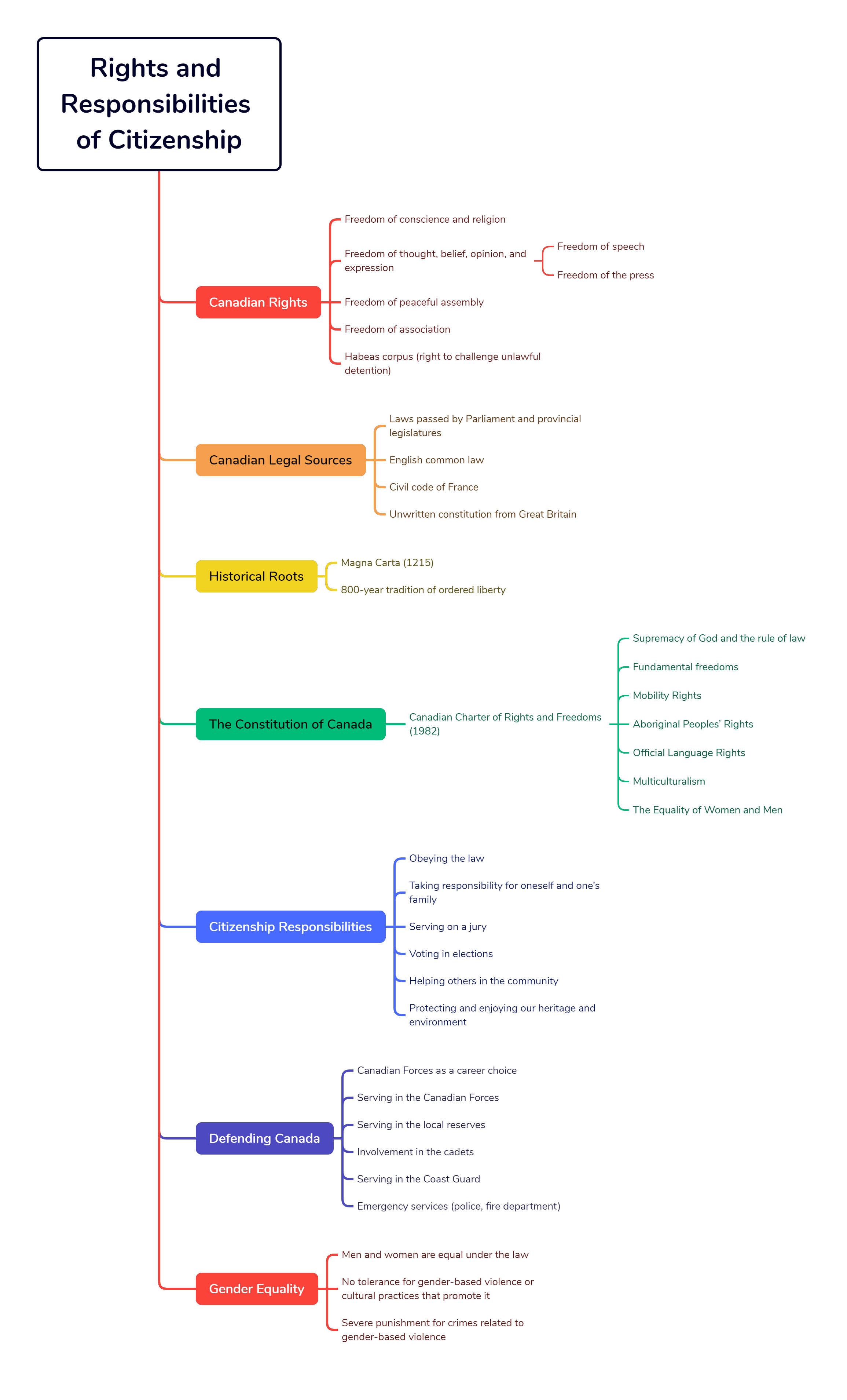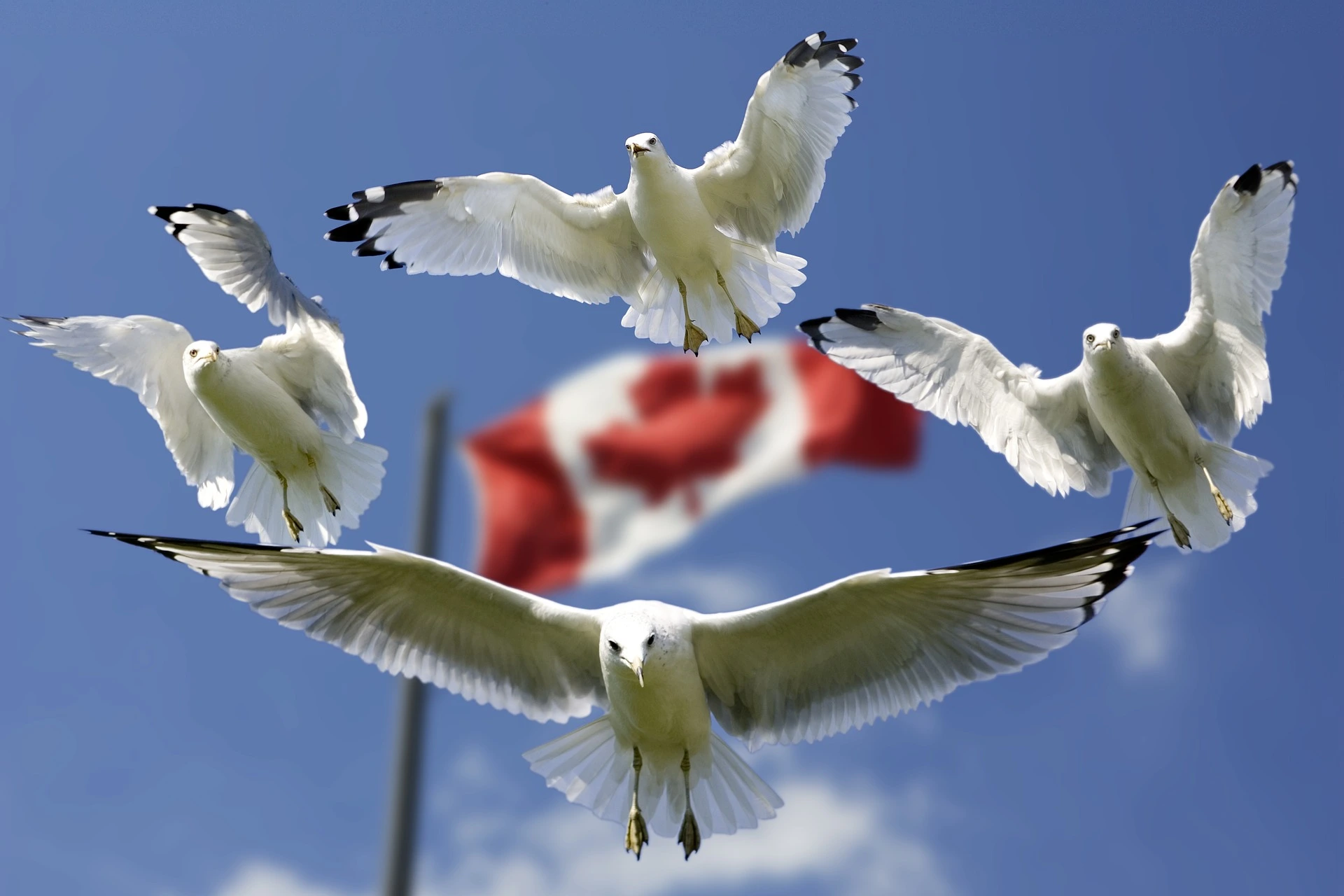You can find the official study guide for Citizenship Rights and Responsibilities on the Citizenship and Immigration Canada website.
At a Glance
Rights and Freedom
- Rights and Responsibilities
- Secured by Canadian law
- Reflect shared traditions, identity, and values
- Sources of Law
- Laws passed by Parliament and provincial legislatures
- English common law
- Civil Code of France
- Unwritten constitution inherited from Great Britain
- Tradition of Ordered Liberty (since Magna Carta in 1215)
- Freedom of conscience and religion
- Freedom of thought, belief, opinion, and expression
- Freedom of peaceful assembly
- Freedom of association
- Habeas corpus (right to challenge unlawful detention)
The Rights of a Canadian Citizen
- Canadian Charter of Rights and Freedoms (1982)
- Recognizes the supremacy of God and the rule of law
- Summarizes fundamental freedoms and sets out additional rights:
- Mobility Rights
- Aboriginal Peoples’ Rights
- Official Language Rights and Minority Language Educational Rights
- Multiculturalism
Equality of Women and Men
- Equal under the law in Canada
- No tolerance for barbaric cultural practices
- Spousal abuse
- “Honour killings”
- Female genital mutilation
- Forced marriage
- Other gender-based violence
Citizenship Responsibilities
- Obeying the law
- Taking responsibility for oneself and one’s family
- Serving on a jury
- Voting in elections
- Helping others in the community
- Volunteering
- Protecting and enjoying our heritage and environment
Defending Canada
- No compulsory military service, but serving is a noble way to contribute
- Regular Canadian Forces (navy, army, air force)
- Part-time navy, militia, and air reserves
- Cadets for young people
- Serving in the Coast Guard or emergency services in your community
- Police force
- Fire department
Mind Map

Freedom and Rights
Canadian citizens are endowed with rights and responsibilities that are deeply rooted in our history, safeguarded by Canadian law, and reflective of our shared traditions, identity, and values.
Canadian law draws from diverse sources, including legislation enacted by Parliament and provincial legislatures, English common law, the civil code of France, and the unwritten constitution inherited from Great Britain.
Collectively, these elements uphold an 800-year-old tradition of ordered liberty for Canadians, tracing back to the signing of the Magna Carta in 1215 in England (also known as the Great Charter of Freedoms), encompassing:
- Freedom of conscience and religion;
- Freedom of thought, belief, opinion, and expression, inclusive of freedom of speech and press;
- Freedom of peaceful assembly; and
- Freedom of association.
Habeas corpus, which is the right to challenge unlawful detention by the state, is a principle derived from English common law.
In 1982, the Constitution of Canada was amended to incorporate the Canadian Charter of Rights and Freedoms. The Charter commences with the words, “Whereas Canada is founded upon principles that recognize the supremacy of God and the rule of law.” This statement underscores the significance of religious traditions in Canadian society and the inherent dignity and worth of every individual.
The Charter encapsulates fundamental freedoms while also enumerating additional rights. Some of the most significant among these include:
- Mobility Rights — Canadians can live and work anywhere within Canada, freely enter and exit the country, and apply for a passport.
- Aboriginal Peoples’ Rights — The rights assured in the Charter will not negatively impact any treaty or other rights or freedoms of Aboriginal peoples.
- Official Language Rights and Minority Language Educational Rights — French and English hold equal status in Parliament and across the government.
- Multiculturalism — A defining characteristic of Canadian heritage and identity. Canadians cherish the gift of each other’s presence and strive to uphold pluralism and live in harmony.
Equality of Women and Men
In Canada, all individuals are treated equally under the law, regardless of gender.
The country’s spirit of openness and generosity does not extend to inhumane cultural practices that condone spousal abuse, “honour killings,” female genital mutilation, forced marriages, or any other forms of gender-based violence. Individuals found guilty of committing these crimes face severe penalties under Canada’s criminal laws.
Citizenship Responsibilities
In Canada, rights are accompanied by responsibilities. These encompass:
- Obeying the law — One of the foundational principles of Canada is the rule of law. Both individuals and governments are governed by laws, not arbitrary actions. No person or group is above the law.
- Taking responsibility for oneself and one’s family — Securing employment, caring for one’s family, and diligently working to the best of one’s abilities are integral Canadian values. Work contributes to personal dignity, self-respect, and Canada’s prosperity.
- Serving on a jury — When summoned, you are legally obligated to serve. The privilege of serving on a jury is crucial to the functioning of the justice system, which relies on impartial juries composed of citizens.
- Voting in elections — The right to vote carries with it the responsibility to participate in federal, provincial or territorial, and local elections.
- Helping others in the community — Millions of volunteers selflessly dedicate their time to assist others without compensation—aiding those in need, contributing at your child’s school, volunteering at a food bank or other charity, or supporting newcomers to integrate. Volunteering is an excellent way to acquire useful skills and develop friendships and connections.
- Protecting and enjoying our heritage and environment — Every citizen plays a role in preventing waste and pollution while preserving Canada’s natural, cultural, and architectural heritage for future generations.
Defending Canada
While Canada does not enforce compulsory military service, serving in the regular Canadian Forces, which includes the navy, army, and air force, is a noble way to contribute to Canada and can be an excellent career choice. You can find more information at www.forces.ca.
You also have the option to serve in your local part-time navy, militia, and air reserves. This can provide you with valuable experience, skills, and contacts. For young people, involvement in the cadets can foster discipline, responsibility, and skills. More details can be found at www.cadets.ca.
Additionally, you may choose to serve in the Coast Guard or join emergency services in your community such as a police force or fire department. By helping to protect your community, you continue the legacy of Canadians who have made sacrifices in service of our country.
Frequently Asked Questions
Q1: What are the rights and responsibilities of Canadian citizens?
Canadian citizens have rights and responsibilities that come from our history, are secured by Canadian law, and reflect our shared traditions, identity, and values. These responsibilities include obeying the law, taking responsibility for oneself and one’s family, serving on a jury when called to do so, voting in elections, helping others in the community, and protecting and enjoying our heritage and environment.
Q2: What is the Magna Carta?
The Magna Carta, also known as the Great Charter of Freedoms, was signed in 1215 in England. It is a significant document that laid the foundation for many freedoms we enjoy today.
Q3: What is Habeas Corpus?
Habeas corpus is a legal action that allows individuals to seek relief from unlawful detention by the state.
Q4: Is military service compulsory in Canada?
No, there is no compulsory military service in Canada. However, serving in the regular Canadian Forces (navy, army, and air force) is a noble way to contribute to Canada and an excellent career choice. You can also serve in your local part-time navy, militia and air reserves, or serve in the Coast Guard or emergency services in your community such as a police force or fire department.
Q5: What is the significance of the Canadian Charter of Rights and Freedoms?
The Canadian Charter of Rights and Freedoms, entrenched in the Constitution of Canada in 1982, is a vital document that outlines the fundamental rights and freedoms of Canadians. It underscores the importance of religious traditions to Canadian society and the inherent dignity and worth of every individual.
Q6: What are some of the rights outlined in the Canadian Charter of Rights and Freedoms?
The Charter encapsulates fundamental freedoms such as freedom of conscience and religion, freedom of thought, belief, opinion, and expression, freedom of peaceful assembly, and freedom of association. It also outlines additional rights like Mobility Rights, Aboriginal Peoples’ Rights, Official Language Rights and Minority Language Educational Rights, and Multiculturalism.
Q7: What is meant by ‘Mobility Rights’ in Canada?
Mobility Rights in Canada refer to the freedom for Canadians to live and work anywhere they choose in Canada, enter and leave the country freely, and apply for a passport.
Q8: What are ‘Aboriginal Peoples’ Rights’ in Canada?
Aboriginal Peoples’ Rights in Canada ensure that the rights guaranteed in the Charter will not negatively impact any treaty or other rights or freedoms of Aboriginal peoples.
Q9: What are ‘Official Language Rights and Minority Language Educational Rights’ in Canada?
Official Language Rights and Minority Language Educational Rights in Canada ensure that French and English hold equal status in Parliament and across the government.
Q10: What does ‘Multiculturalism’ mean in the context of Canada?
Multiculturalism is a defining characteristic of Canadian heritage and identity. Canadians cherish each other’s presence and strive to respect pluralism while living harmoniously.
Q11: What does it mean to serve on a jury in Canada?
Serving on a jury in Canada means that when summoned, you are legally obligated to serve. The privilege of serving on a jury is crucial to the functioning of the justice system, which relies on impartial juries composed of citizens.
Q12: How can one contribute to their community in Canada?
In Canada, one can contribute to their community by volunteering their time to assist others without compensation—aiding those in need, contributing at your child’s school, volunteering at a food bank or other charity, or supporting newcomers to integrate. You may also choose to serve in emergency services such as a police force or fire department.

Leave a Reply